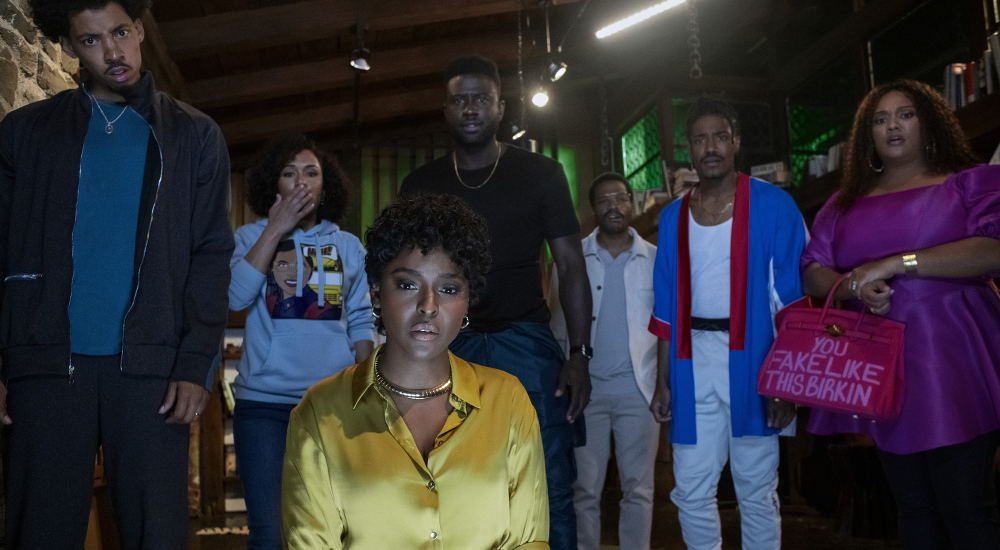"Game on, bitch."
A satire that begins with its title, Tim Story's The Blackening boldly uses humor and exaggeration to expose and criticize stupidity. That is the Oxford Dictionary definition of the word "satire." To say the filmmakers took that connotation literally would be a monstrous understatement as they tackle the rocky, often lethal relationship between Black people and slasher films, notably the well-worn trope of the Black character always dying first.
The film, filled to the brim with social commentary and humor, pointedly asks one question: When everyone in a horror movie is Black, can anyone survive?
Taking place over the Juneteenth holiday weekend, The Blackening positions seven college friends, set for a weekend of drinks, drugs, and card games, in a remote cabin with a killer lurking in the shadows. When the group uncovers "The Blackening," a racially charged board game set perfectly on a table in a mysterious back room, they ignore all warning signs and play their hand. They aren't aware that the game comes with a specific set of rules, many of which work to ensure their demise.
Though loosely referencing several mainstream horror stories, the film's prologue places Jay Pharaoh and Yvonne Orji in a direct homage to, and satirical commentary on, the Scream franchise. The pair arrive at the cabin early to set up for the weekend's festivities. In doing so, they encounter a board game in a large, tucked-away "game room." When a Sambo-inspired caricature begins to speak directly to them, calling them to play, they begrudgingly oblige.
As the other friends begin to arrive, each with their own issues and insecurities, they soon find themselves in the same room, looking down on the same game, equally hellbent on not playing. But they eventually claim a token and draw a card, collectively working to answer questions that will test (and ideally confirm) their "Blackness."
The questions, deeply rooted in Black media and cultural history, are meant for the entire group—a string of correct responses required for survival. One misstep, and the game is over.
At one point, the group must name a Black actor on Friends. Cognizant viewers will identify the cultural humor that lies within the question. They will presumably know the correct answer. Others will fail to grasp the humor and struggle to connect to the characters or their situation. For them, the film likely won't resonate.
Another card asks the players to identify the "Blackest" among them, sacrificing the selected to the killer. A heated discussion breaks out as each member defends themselves, one going as far as to admit they voted for Trump, twice. The dialogue, highly improvised throughout, is quick and responsive, adding to the humor as you feel the group succumbing to a state of panic.
While jumps and scares are undoubtedly present, co-writers Tracy Oliver and Dewayne Perkins prioritize the humor, unapologetically sacrificing plot points for the sake of a laugh. The tropes, present from beginning to end, give the film its unique POV. But it is ultimately the cast that sells the story. Their characters are heavily flawed, yet we still care for their safety. And while there is little mystery as to the culprit aiming the crossbow, the all-in actors ensure you remember the journey over the destination.

